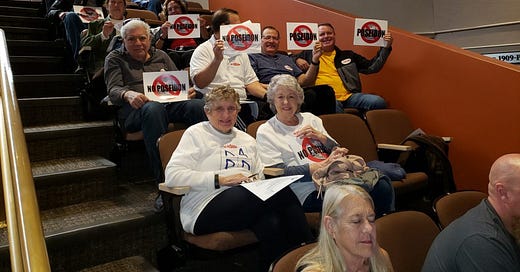Poseidon was Delaying its Own Desal Project in 2008: Looking Back
Note: This story was first published in print by the OC Voice in May 2008 under the headline, "Poseidon's Delay: Coastal Commission waits 2 years for answers" and has been edited for clarity.
The Santa Ana Regional Water Quality Control Board is scheduled to vote on the proposed $1 billion Poseidon ocean desalination project after virtual public hearings to be held on July 30 and 31 at 8:30 a.m. If needed, another meeting will be held on August 7, 2020 at 9:00 a.m.
To read related documents, go to this link, log in (username: Public Comments, password: HpTB32), open the Poseidon folders, and click on the file documents to download.
Speakers will be given 2 minutes each, but those who need extra time for oral comments can send a request with justification to the staff at Jayne.Joy@waterboards.ca.gov or call (951) 782-3284 by 5:00 p.m. on July 20, 2020.
"These meetings will be video and teleconference meetings only, with no physical meeting location (authorized by and in furtherance of Executive Orders N-29-20 and N-33-30)", according to a notice published by the Board.
The public meetings will be broadcast on live video on Cal-Span.
Public oral comments will be held on July 30 and 31. If the board needs to ask more questions of its staff or to deliberate further, a third meeting will take place on August 7 at 9:00 a.m., also to be broadcast by video stream.
Instructions on how to connect to the meetings by telephone to make public comments will presumably be presented on the meeting agendas.
The issues described in this previously published story remain largely the same and just as relevant today. They will be part of the discussion at the board meetings.
This and other previously published stories are being recirculated between now and July 30 for concerned readers who wish to virtually (or by telephone) attend the meeting of The Santa Ana Regional Water Quality Control Board to observe or comment on the proposed Poseidon ocean desalination project.
Please share this article on social media; and, please donate to the Surf City Voice to help support our efforts to inform you.
Tom Luster, an environmental scientist for the California Coastal Commission, has waited two years for Poseidon Resources to complete its application for a Coastal Development permit for a proposed Huntington Beach ocean desalination plant.
Luster also says that the cost of water to be produced by a desalination plant approved by the City of Huntington Beach in 2006 has been greatly underestimated by the developer and that proposed mitigation measures for its impact on marine life are inadequate.
The desalination plant would suck in 100 million gallons of ocean water and convert it into 50 million gallons of drinking water daily.
Poseidon plans to co-locate its desalination plant with the AES power generating plant on Newland and PCH to take cost-saving advantage of the latter's once-through-cooling (OTC) system to gather the needed ocean water for conversion.
Twenty other power generating plants along the California coast use OTC and together suck in 17 billion gallons of seawater each year, killing virtually all the marine organisms passing through their membranes, contributing significantly to a 60 percent decline in marine species, according to a 2005 report by the California Energy Commission.
Legislative trends, a recent court ruling, and a resolution by the California State Lands Commission, are bringing OTC to a close , sooner or later. "It's the end of once-through-cooling systems in the U.S.," Surfrider Foundation desal expert Joe Geever told the Voice in September. "AES is fighting the changes tooth and nail", he said.
Incomplete Application
The seven-page "Notice of Incomplete Application" cited instances where Poseidon had given incomplete information or made dubious claims about permits, environmental effects, environmentally friendly alternatives and costs related to the project in response to a request for information made a year earlier.
Poseidon's desalination plant would take publicly owned ocean water, convert it to tap water, and sell it back to the public for profit.
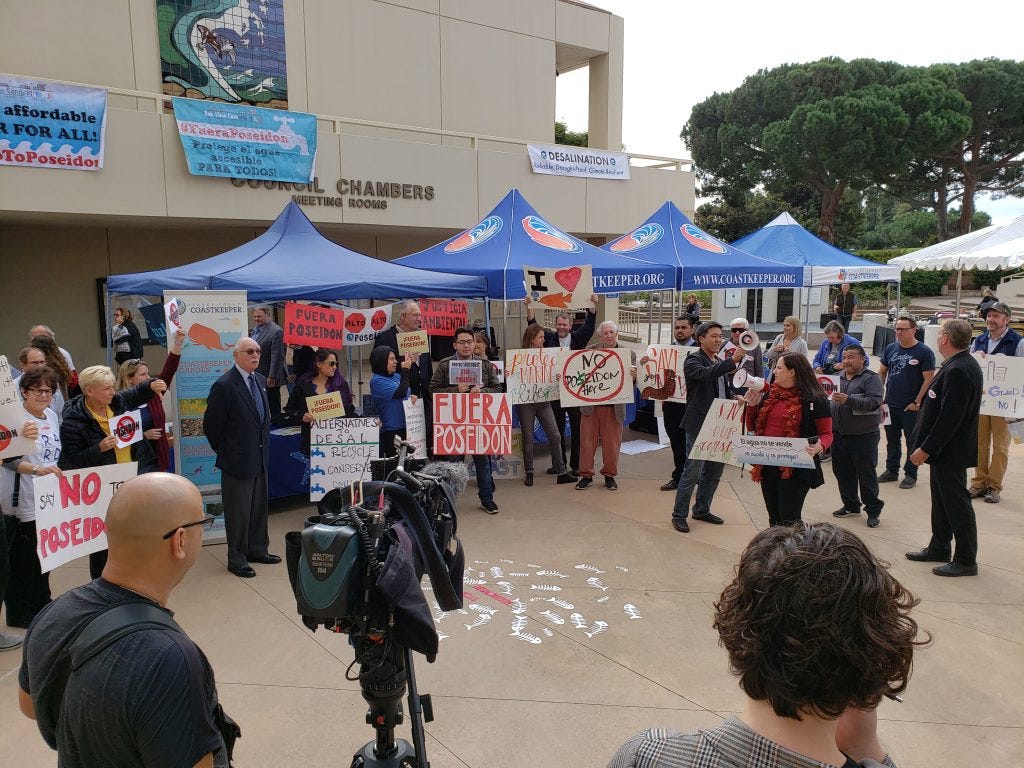
Project opponents criticize the company for ignoring key environmental impact issues and question whether the plant would ever be built, citing rising costs of fossil fuel and electricity needed to operate the plant, the cost of the water--as high as $2,000 per acre-foot--and a lack of buyers.
Poseidon originally told the city that the project would cost $155 million to build and that its desalinated water would sell for $800/AF, but that amount was based on subsidies from the Metropolitan Water District of Southern California that might not materialize.
Poseidon has since revised its capital costs estimate to $355 million and the selling price of its water at $950/AF. But Luster's letter challenges the water-price estimate as inexplicably and substantially less than the estimated costs of other OTC desalination projects proposed for the California coast. "Poseidon's response does not provide an adequate basis for these substantially lower costs," Luster wrote.
In fact, Luster told the Voice, the price of Poseidon's water is more likely to be around $1,400 - $1,500 per AF, about 4 or 5 times the cost of local well water used in Huntington Beach and 3 times the cost of wastewater to be produced by a new plant under construction by the Orange County Water District and Orange County Sanitation District.
Luster attributes Poseidon's lower cost estimate in part to its claim that it will pay only $0.07 per kilowatt-hour for electricity needed to run its plant.
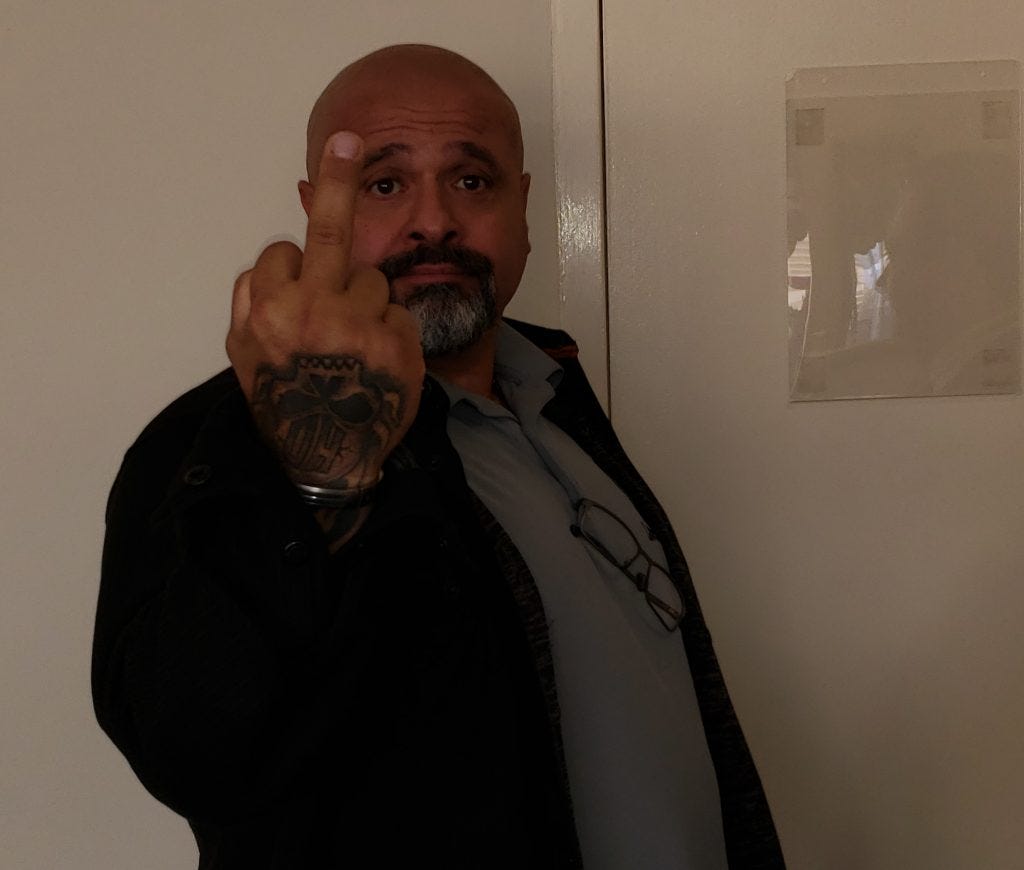
The cost would actually increase about $50 per AF for each $0.01 per kilowatt-hour, he says, "so the published rates would increase your proposed water costs by at least several hundred dollars per acre-foot," the letter states.
Luster asked Poseidon to supply a copy of its contract with AES, which it has refused to do in the past when asked by the City of Huntington Beach, along with a sample electrical bill to help clarify how it arrived at its unlikely cost estimate.
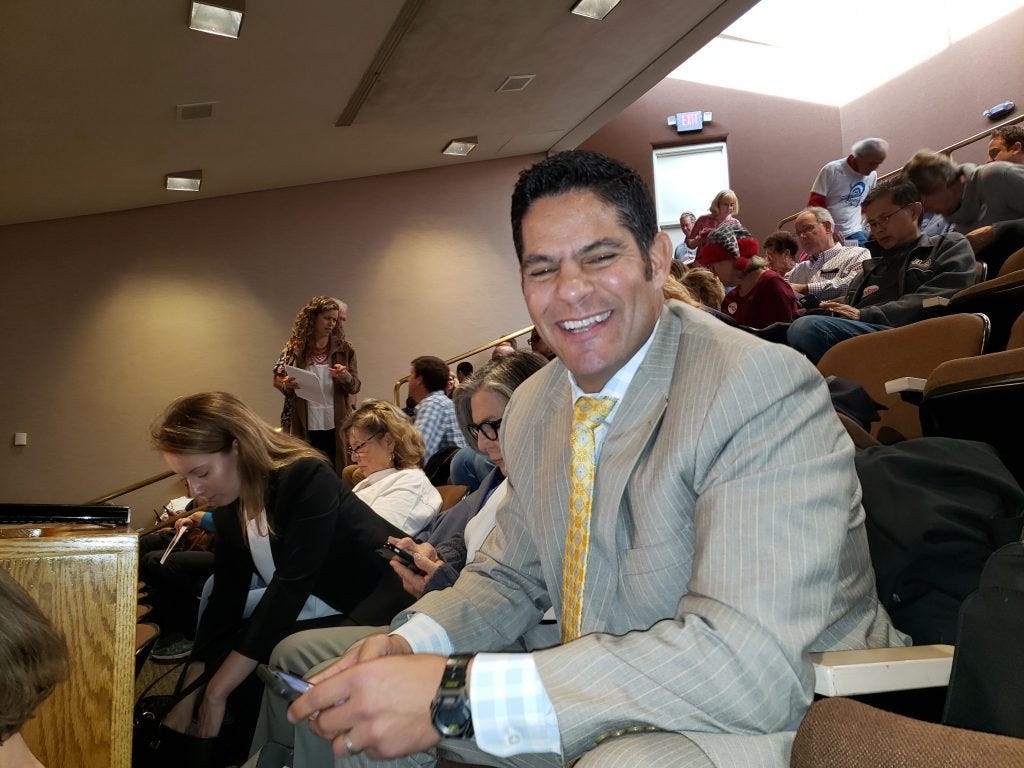
The letter also challenges Poseidon's assertion that environmental damage mitigation already take by the AES power plant is sufficient because the desal plant would be using the same water intake system and would not create additional environmental stress.
The AES mitigation was limited, Luster replied in his letter, to a smaller water flow coming from two of four generating units at the power plant, while the desalination plant's water flow would be much higher than has been previously studied. Besides, he added, the AES mitigation was not approved by the Commission because it didn't meet its standards.
Other points made by Luster in his Poseidon letter:
*Poseidon's own research shows that a subsurface ocean water intake system, favored by environmentalists, would be economically feasible, while creating "fewer adverse environmental impacts" than the company's proposal.
*Poseidon has not provided sufficient information describing or providing "feasible mitigation measures" for the desalination plant's future effects on coastal resources from the estimated 200 - 500 million pounds of carbon dioxide it will emit into the air.
*Nor has Poseidon provided permits to create a 12-mile-long pipeline needed to transport the desalinated water it produces through Huntington Beach and Costa Mesa. In fact, the Voice has learned, Poseidon is currently negotiating franchise agreements with Mesa Consolidated Water and the City of Huntington Beach. Former Costa Mesa mayor Peter Buffa is Poseidon's negotiator and is briefing city council members on a proposed plan to replace a water line in return for permission to use the new one for transporting its water.
HB City Administrator Paul Emery told the Voice that the city is negotiating with Poseidon but that any proposal for the City Council's consideration was "not eminent."
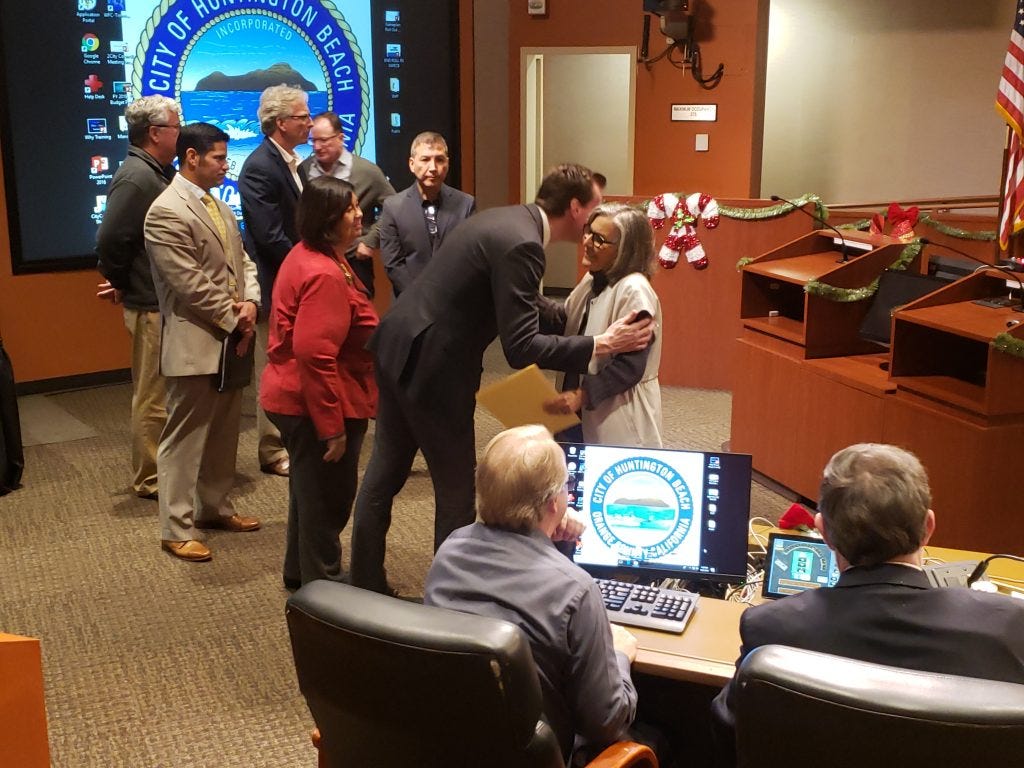
Attempts by the Voice to get a response from Poseidon were no more successful than the Coastal Commission's efforts.
In an e-mail addressed to other Poseidon CEOs but obtained by the Voice, senior Vice President Nicolay Voutchkov wrote, in response to my written questions, "Let me know if you need any support in responding to these questions. We have already addressed them in our last response to the CCC. This guy has an outdated info."
But CEO Andrew Kingman replied that "no reply necessary, John Earl is not a friend and we won't get anywhere with him."
PLEASE CLICK HERE AND DONATE TO HELP
(Note: You can pay with a credit card and do not need a PayPal account). Or, click the donate button below. Or, scan the QR Code below with your smart phone.

